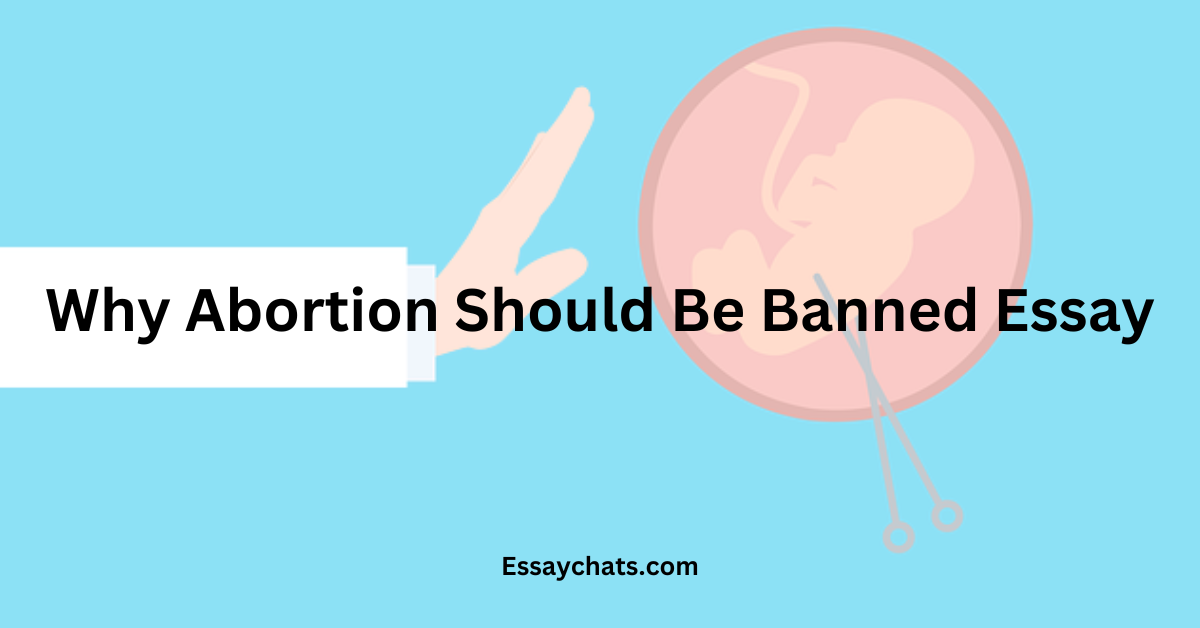Are you looking for Why Abortion Should Be Banned Essay? Then you have it at the right place.
Read on.
Introduction
Abortion, the intentional termination of a pregnancy, is a controversial and emotionally charged topic that has generated intense debates worldwide. This essay aims to explore the reasons why abortion should be banned, considering various aspects such as the sanctity of human life, religious and ethical considerations, potential psychological and health complications, as well as the risks associated with unsafe procedures and limited accessibility. By delving into these factors, we can understand the arguments supporting the prohibition of abortion.
Why Abortion Should Be Banned Essay
Abortion is a multifaceted issue that revolves around questions of morality, ethics, and the rights of the unborn. On the one hand, proponents argue for protecting the sanctity of human life, asserting that the moment of conception marks the beginning of a potential life that deserves respect and legal protection. On the other hand, advocates for the legalization of abortion stress a woman’s right to autonomy and decision-making regarding her own body, emphasizing the importance of reproductive freedom.
Thesis Statement
Abortion should be banned due to the ethical and moral implications surrounding the sanctity of human life, religious beliefs, potential psychological and health risks for the mother, and the need to eliminate unsafe procedures and improve accessibility to support women’s well-being.
Definition and History of Abortion
Abortion is intentionally terminating a pregnancy, typically performed through medical procedures or medications. Throughout history, diverse cultures and societies have held different perspectives on abortion, some considering it morally permissible while others condemning it as wrong. Understanding the historical context of abortion helps us appreciate the evolution of attitudes and legislation surrounding this practice.
What is Abortion?
Abortion is the deliberate removal or expulsion of removal of a fetus from the uterus before it can survive independently. It encompasses various methods, such as medication-induced abortion and surgical procedures, depending on the gestational stage. It is essential to differentiate abortion from other medical procedures to assess its moral implications accurately.
Ancient Practices & Views on Abortion
Abortion has existed since ancient times, and attitudes toward its morality have varied across cultures and religions. Historical perspectives on abortion shed light on the complexity of this issue and reveal the diversity of beliefs and practices regarding the permissibility of terminating pregnancies.
Historical Timeline of Abortion Legislation
Governments and societies throughout history have sought to regulate and legislate abortion, reflecting prevailing attitudes and social norms. A chronological exploration of abortion legislation highlights the ever-evolving legal frameworks and societal debates surrounding this contentious topic.
Reasons Why Some People Believe Abortions Should be Banned
Several compelling arguments exist in favor of banning abortion:
Sanctity of Human Life
Supporters argue that an unborn baby possesses the potential for life from conception and should be afforded the same rights as any other human being. Protecting the sanctity of life is a fundamental value shared by many.
Religious Beliefs, Morals, and Ethics
Religious teachings and ethical frameworks often emphasize the sanctity of life and condemn the intentional termination of pregnancies. Many individuals draw upon their religious and moral convictions to argue for the prohibition of abortion.
Psychological Damage to the Mother
Advocates for banning abortion contend that women may experience profound psychological consequences following the procedure, such as guilt, depression, or regret. Protecting women’s mental health requires considering the potential psychological impacts of abortion.
Health Complications for the Mother
Abortion procedures carry inherent risks, including physical complications that can harm the mother’s health. Proponents of banning abortion assert that protecting women’s well-being necessitates prohibiting this practice.
Unsafe Procedures and Accessibility Issues
In regions where abortion is illegal or restricted, women may resort to unsafe methods, risking their lives and health. Advocates for a ban argue that eliminating the need for unsafe procedures and ensuring women’s access to safe alternatives should be prioritized.
Counter Arguments for Keeping Abortions Legal
While solid arguments support the ban on abortion, counterarguments exist that advocate for keeping it legal:
Women’s Right to Choose
Supporters of legal abortion emphasize a woman’s right to autonomy and decision-making regarding her body, including the option to continue or terminate a pregnancy.
Compassionate Reasons for Having an Abortion
Instances such as cases of rape, incest, or potential harm to the mother’s life are cited as compassionate grounds for permitting abortion. Advocates argue that women facing such circumstances should have the freedom to make choices based on their unique situations.
Conclusion
The issue of banning abortion is complex, given its ethical, moral, and social implications. This essay has explored the reasons why abortion should be banned, taking into account the sanctity of human life, religious and ethical beliefs, potential psychological and health complications, as well as the risks associated with unsafe procedures and limited accessibility. While recognizing the counterarguments supporting the legality of abortion, the aim of banning abortion ultimately centers on protecting the rights and well-being of both the unborn and the women involved. By engaging in informed and compassionate discussions, society can strive to find common ground on this multifaceted issue. We can foster a more compassionate and equitable society for all through education, support, and alternative solutions.
Also Read:
